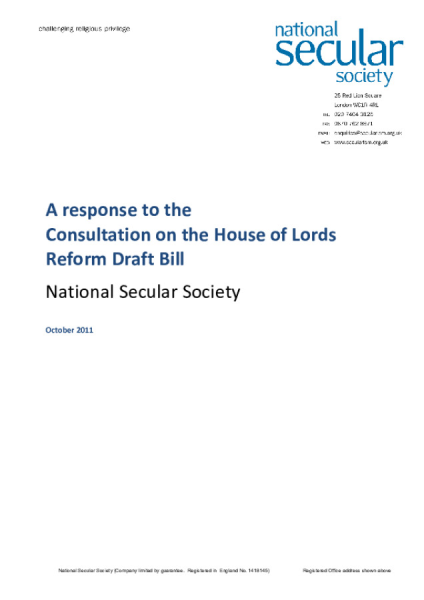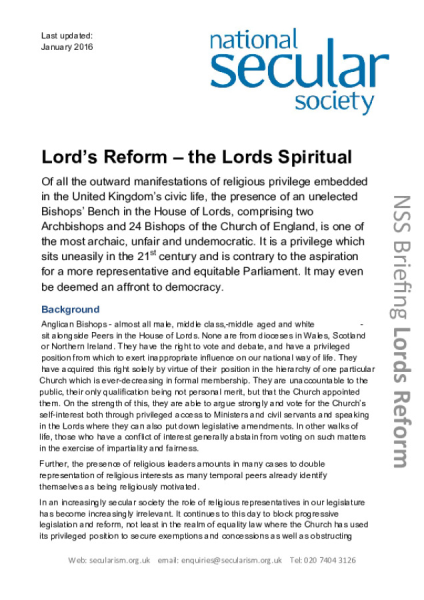Religious Representation in the House of Lords
Two Archbishops and 24 Bishops of the Church of England currently have seats as of right in the House of Lords. The NSS has long argued that this is unfair, undemocratic and undesirable.
We maintain that any serious proposals to reform the Lords must address the unjustified privilege of the Bishops' Bench.
The United Kingdom is unique among Western democracies in giving religious representatives seats in its legislature as of right. The vast majority of Western democracies have abandoned all links between Church and State, with no discernible adverse consequences.
We believe it is now time for the Bishops to be completely removed from the House of Lords. It is also vitally important that the reformed Second Chamber should not have any specific religious representation whether ex-officio or appointed, whether of Christian denominations or any other faiths. The presence of religious leaders amounts to double representation of religious interests as many temporal peers already identify themselves as being religiously motivated.
Many previous proposals have been to extend religious representation in the Lords to other religions, rather than remove the bench of bishops. This is a position currently supported by the Church of England. We think this is completely the wrong answer. Such a move would not only be unworkable and unpopular, but it would also carry a high risk of creating resentment in minority communities that are already sensitive to discrimination.
The NSS maintains that retaining the bench of bishops or extending religious representation by selection on religious grounds alone would be inimical to the Government's stated aim of 'modernisation' and would be an affront to democracy.
After over a century of decline in religious attendance in Britain the claim that Bishops — or any other religious representatives — speak for any significant constituency is clearly far off the mark. Less than 2% of the British population now attend Anglican services on the average Sunday. By 2050 this figure is forecast to drop to just 0.3% of the population.
In an increasingly secular society the role of religious representatives in our legislature has become increasingly irrelevant, and has in fact stood in the way of progressive legislation.
The NSS also rejects the implication that the Bishops somehow provide special moral insights denied to other members of the House. The idea that Bishops or any other 'religious leaders' have any monopoly on issues of morality is offensive to many non-religious UK citizens. The NSS contends that those who profess no religion are no less capable of making moral and ethical judgements.
The NSS believes that neither prayers nor religious oaths should form any part of the proceedings in a reformed House of Lords.
Call for reform
The latest and failed attempt at House of Lords reform collapsed in acrimony within the Conservative / Lib-Dem coalition Government in August 2012.
We will continue to argue against the presence of Bishops in Parliament and will be pressing all political parties to include reform of the Lords in their next election manifestos. You can help us by contacting your MP and asking them to support any proposals that ensure no seats are reserved in Parliament for Bishops of the Church of England, or indeed for any faith community leaders.
Find out more
Please note some parts of this briefing paper are in the process of being updated.



